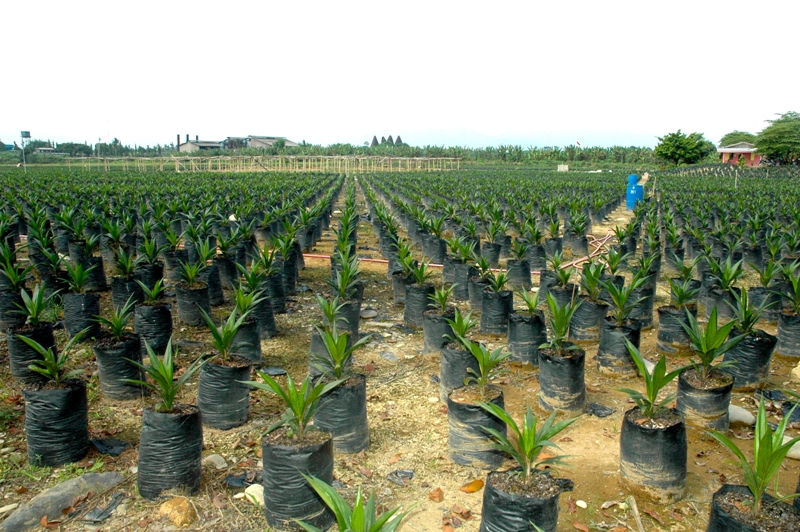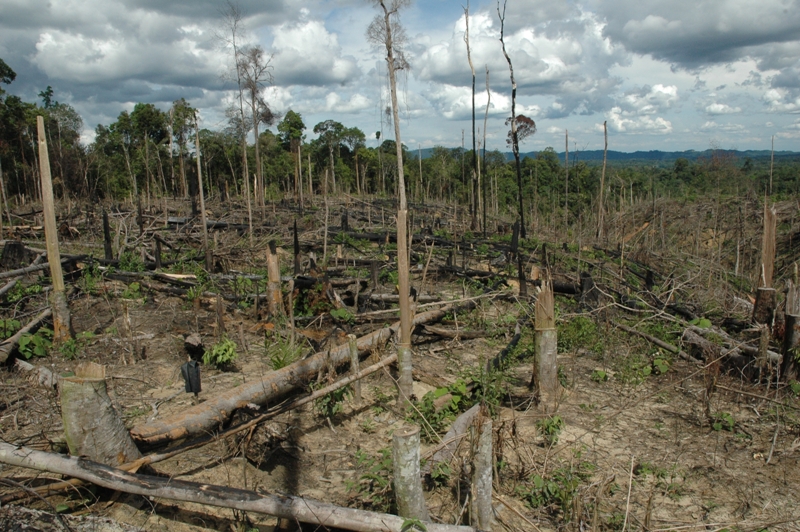Gimme a break. Gimme a break. But don't break me off a bite of that KitKat bar because it's destroying the habitat of the orangutan. Or haven't you heard? The fact of the matter is palm oil, listed in the ingredients of the popular candy bar and other common grocery store purchases as "vegetable oil," is a resource fraught with complex problems.
"The wildlife-rich forests of Indonesia and Malaysia are being chain-sawed to make way for palm-oil plantations," according to Britain's the Independent.
Palm oil plantations threaten the habitat of the orangutan. (Photo courtesy of Garry Sundin)
Those forests are the only home of the orangutan, and when they're gone, it will follow soon after.
According to the paper:
Thirty square miles are felled daily in a burst of habitat destruction that is taking place on a scale and speed almost unimaginable in the West ... In their place come palm-oil plantations stretching for mile after mile, producing cheap oil -- the cheapest cooking oil in the world -- for everyday food.
Those foods are not limited to just old-time candy bars, as Angelfire.com reports, palm oil is used in other edibles as well, including Kellog's Special K, Girl Scout and Pepperidge Farm cookies, McDonald's foods, Sweet n' Low, Cheez-it, Odwalla soy milk, Ben & Jerry's ice cream and Russell Stover chocolates, among a wide array of others.
It's also used in personal care products, such as Avon, Cover Girl, Bumble & Bumble, Clinique, Dial, Dove, Lancome, Mary Kay, Neutrogena, Sephora and Herbal Essences and many more.
But wait, there's more. Among the many other products that you might not have ever imagined being involved in the palm oil trade are Dr. Scholl's, Tom's of Maine, Nature's Way, Muscle Tech, GeniSoy and Naturally Vitamins.
A 2008 survey suggested that only 7,000 orangutans still remain in the wild. (Photo courtesy of Garry Sundin)
In its 2005 report, "The Oil for Apes Scandal," Friends of the Earth concluded that one in every 10 supermarket products contained palm oil. And NBC reports that "palm oil is found in almost half of all packaged supermarket products."
"There are fewer than 7,000 of the critically endangered Sumatran orangutans left in the wild, according to a 2008 survey" by Ian Singleton of the Sumatra Orangutan Conservation Programme. "The largest number live in a vast area of swampland and lowland forest close to the northern tip of the Indonesian island of Sumatra."
Fortunately, someone is doing something about it. Orangutan Odysseys is attempting to curb the destruction of the rainforests to protect the great apes. The company, now in its fourth year of operation, is emblematic of the relatively recent eco-tourism industry. Its mission, according to its website, is to "provide unforgettable real-life experiences while supporting local nonprofits engaged in keeping orangutans and their habitat safe."
Expedition Manager Garry Sundin worries that things are getting worse.
"There are more and more concessions being issued to palm oil companies across Borneo and Sumatra, and there are still something like 30 football fields per hour of clearing being done as we speak," Sundin told me.
"There needs to be a moratorium on all land suitable for orangutan and other threatened species very soon or they will all become extinct. Sumatra alone has had 80 percent of all orangutan habitat cleared in the last 50 years," he said.

Orangutan Odysseys contributes some of its profits to orangutan care centers. (Photo courtesy of Garry Sundin)
So are there alternatives to palm oil?
"Basically any other vegetable oil," Sundin told me.
He continued: "The issue is not against palm oil the product, it's where they are choosing to grow it that's the problem. They are given land concessions on primary rainforests, which are typically orangutan habitat. Then, they clear the land and sell all the timber, fertilize and poison the ground and water, then plant palm oil trees that act like sponges and take all the remaining water from the ground causing floods and other problems. They could plant these trees on already degraded lands, but this would cost them more money, and less profit, so they choose not to do it."
A portion of the company's proceeds go directly to orangutan care centers in the particular area where the traveler has visited.
The bottom line is this: Orangutans will go extinct if consumer demand for cheap palm oil does not change.
This New Year, consider a resolution to eliminate or at least reduce your consumption of palm oil products.
For a list of such products, go to angelfire.com/planet/palmoilproducts. And for more information about Orangutan Odysseys and for upcoming tours, go to orangutanodysseys.com. In addition, the Palm Oil Action Group web site is among a number of sites that inform people about their choices. Greenpeace also actively campaigns against palm oil. Most orangutan conservation non-governmental organizations also have links on their web sites.

